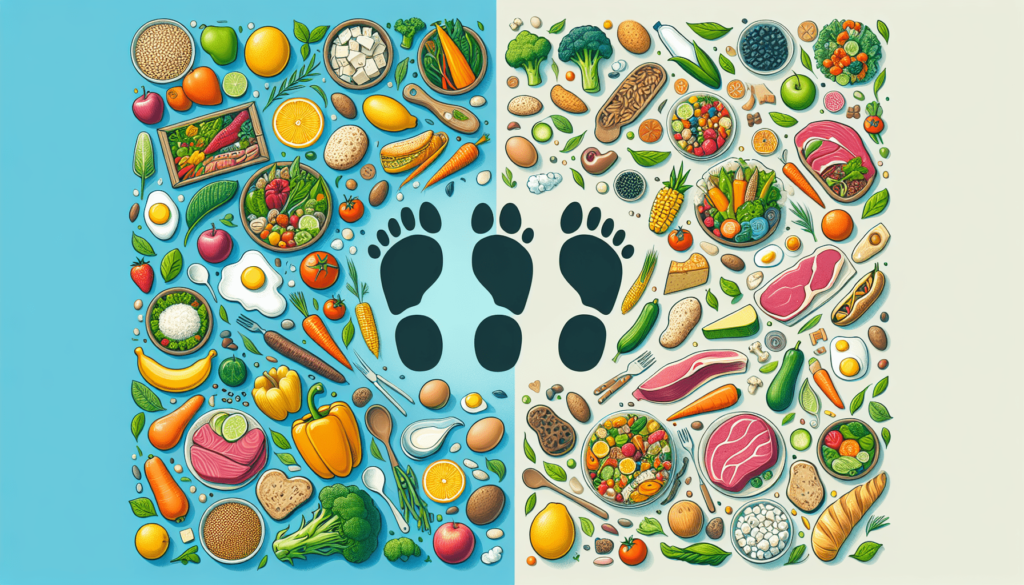Did you know that the food choices you make can have a significant impact on the environment? From the farm to your plate, every step of the food production process involves the use of resources and can contribute to greenhouse gas emissions and water pollution. In this article, we will explore the environmental impact of different types of diets, including plant-based, vegetarian, and meat-based diets. By understanding how our food choices affect the planet, we can make more informed decisions about what goes on our plates and ultimately contribute to a more sustainable future.
1. Introduction
Welcome to this comprehensive article on the environmental impact of different types of diets! In today’s world, where environmental concerns are at the forefront, it is crucial to understand how our dietary choices can contribute to or mitigate these issues. This article will explore the environmental impact of various diets, including meat-based diets, vegetarian diets, vegan diets, pescatarian diets, and flexitarian diets. By examining factors such as deforestation, greenhouse gas emissions, water consumption, and animal welfare, we can gain a better understanding of how our food choices affect the planet.
2. Definition of Diet
Before delving into the environmental impact of different diets, it is important to establish a clear definition. Generally, a diet refers to the kinds of food that a person consumes regularly. It can include various categories such as meat, vegetables, fruits, grains, and dairy products. Different diets may emphasize or restrict certain types of food based on cultural, religious, health, or ethical reasons.

3. Environmental Impact of Meat-based Diets
Meat-based diets, which include a significant amount of animal products such as meat, poultry, and dairy, have a considerable environmental impact. Let’s explore some of the key factors that contribute to this impact.
3.1 Deforestation
One of the major environmental consequences of meat-based diets is deforestation. The demand for meat leads to the clearing of vast areas of forests to make way for livestock grazing and feed production. This deforestation not only destroys precious habitats for wildlife but also reduces the earth’s capacity to absorb carbon dioxide, exacerbating the issue of climate change.
3.2 Greenhouse Gas Emissions
Meat production, particularly from cattle, is a significant contributor to greenhouse gas emissions. Livestock produces methane, a potent greenhouse gas that contributes to global warming. Additionally, the energy-intensive processes involved in rearing, processing, and transporting animal products further increase the carbon footprint associated with meat-based diets.
3.3 Water Consumption
The production of meat requires substantial amounts of water, contributing to water scarcity concerns. Water is needed not only for animal hydration but also for growing animal feed crops. This water-intensive process depletes water resources and exacerbates the strain on already stressed ecosystems.
3.4 Pollution
Meat production generates various types of pollution. Animal waste from factory farms can contaminate water bodies, leading to the release of harmful pathogens and pollutants. Additionally, the excessive use of antibiotics in livestock farming contributes to antibiotic resistance, posing a significant threat to human health and the environment.
4. Environmental Impact of Vegetarian Diets
Vegetarian diets, which exclude meat and fish but include other animal products such as dairy and eggs, have a comparatively lower environmental impact compared to meat-based diets. Let’s examine some key environmental factors associated with vegetarian diets.
4.1 Land Use
One of the significant advantages of vegetarian diets is reduced land use. Growing crops for human consumption requires less land compared to raising animals for meat production. By reducing the demand for animal-based products, vegetarian diets help conserve land resources and protect natural habitats from further destruction.
4.2 Water Use
Vegetarian diets also have a positive impact on water consumption. As mentioned earlier, meat production is highly water-intensive. By adopting vegetarian diets, individuals reduce their water footprint by decreasing the demand for water in meat and feed production. This reduction in water usage contributes positively to water conservation efforts.
4.3 Greenhouse Gas Emissions
Compared to meat-based diets, vegetarian diets have lower greenhouse gas emissions. While animal agriculture contributes significantly to methane emissions, vegetarian diets reduce this emission source by eliminating meat consumption. By choosing vegetarian options, you can help mitigate climate change and reduce your carbon footprint.
4.4 Biodiversity Conservation
Vegetarian diets also play a role in biodiversity conservation. By reducing the demand for animal-based products, individuals contribute to the protection of diverse ecosystems and the preservation of endangered species. This indirect impact on biodiversity is crucial for maintaining the delicate balance of our planet’s rich ecological diversity.

5. Environmental Impact of Vegan Diets
Vegan diets, which exclude all animal products, go a step further than vegetarian diets in terms of environmental impact reduction. Let’s explore the specific environmental benefits associated with vegan diets.
5.1 Land Use
Vegan diets have the potential to have an even more positive impact on land use compared to vegetarian diets. With no demand for animal-based agriculture, land resources can be redirected towards the production of plant-based foods. This shift can lead to reforestation efforts and the restoration of natural ecosystems, thereby supporting biodiversity conservation.
5.2 Water Use
Similar to vegetarian diets, vegan diets significantly reduce water consumption. By eliminating all animal products, individuals can make substantial contributions to water conservation efforts, as the water footprint associated with animal agriculture is considerably higher than plant-based agriculture.
5.3 Greenhouse Gas Emissions
Vegan diets have a lower carbon footprint compared to both meat-based and vegetarian diets. By eliminating animal agriculture, which is a major source of greenhouse gas emissions, vegan diets offer a significant solution for combating climate change. Choosing plant-based alternatives can help mitigate global warming and protect the environment for future generations.
5.4 Animal Welfare
One of the primary reasons individuals choose vegan diets is the ethical concern for animal welfare. By eliminating animal products, individuals actively contribute to reducing the exploitation and suffering of animals in the industrial farming system. Vegan diets promote compassion and empathy towards all living beings, creating a more harmonious relationship with nature.
6. Environmental Impact of Pescatarian Diets
Pescatarian diets, unlike vegetarian and vegan diets, include fish and seafood while excluding other forms of meat. Although pescatarian diets may seem more sustainable compared to meat-based diets, they still have notable environmental consequences. Let’s examine some of the key factors associated with pescatarian diets.
6.1 Overfishing
One of the major environmental concerns related to pescatarian diets is overfishing. The growing demand for fish and seafood has led to unsustainable fishing practices, depleting fish populations and disrupting marine ecosystems. Overfishing threatens the balance of ocean ecosystems, endangering both marine life and the livelihoods of fishing communities.
6.2 Habitat Destruction
Pescatarian diets, particularly those that include species such as shrimp and prawns, contribute to habitat destruction. The methods employed to catch these species, such as bottom trawling, can devastate fragile marine habitats like coral reefs and seafloors. This destruction disrupts the intricate web of life in the oceans, impacting biodiversity and damaging the broader marine ecosystem.
7. Environmental Impact of Flexitarian Diets
Flexitarian diets are characterized by a flexible approach to food choices, where individuals predominantly follow a vegetarian or vegan diet but occasionally consume small amounts of meat. Let’s explore the environmental impact associated with flexitarian diets.
7.1 Variation in Impact
The environmental impact of flexitarian diets varies depending on the frequency and quantity of meat consumption. However, compared to meat-based diets, flexitarian diets still offer substantial environmental benefits. By reducing meat consumption, even if not entirely eliminated, individuals contribute to the reduction of deforestation, greenhouse gas emissions, water consumption, and pollution associated with traditional meat-based diets.
7.2 Potential Benefits
Flexitarian diets have the advantage of being more inclusive and accessible to a wider range of individuals. By adopting a flexible approach, individuals can gradually modify their dietary choices and make a positive impact on the environment without feeling overwhelmed by strict dietary restrictions. Flexitarian diets play an essential role in encouraging individuals to make conscious and sustainable food choices, bridging the gap towards a more environmentally conscious lifestyle.
8. Sustainable Diets and Practices
Apart from specific diet choices, adopting sustainable food practices can further contribute to reducing our environmental impact. Let’s explore some of these practices:
8.1 Local and Seasonal Foods
Choosing local and seasonal foods reduces the carbon footprint associated with long-distance transportation. By supporting local farmers and consuming foods that are in season, you can minimize the energy needed for production, storage, and transportation, thereby reducing greenhouse gas emissions.
8.2 Organic Farming
Organic farming practices promote environmentally friendly agricultural techniques. By avoiding the use of synthetic fertilizers and pesticides, organic farming protects soil health, biodiversity, and overall ecosystem resilience. Supporting organic agriculture contributes to sustainable food systems and minimizes the contamination of water bodies and soil.
8.3 Food Waste Reduction
Reducing food waste is essential for minimizing the environmental impact of our food systems. By planning meals, practicing portion control, and properly storing leftovers, you can significantly reduce the amount of food that ends up in landfills. Food waste not only contributes to greenhouse gas emissions but also wastes valuable resources such as water, energy, and land.
8.4 Packaging and Transportation
Being mindful of packaging choices and opting for eco-friendly alternatives can also help reduce environmental impact. Choosing foods with minimal packaging or packaging made from recycled materials reduces waste and encourages sustainable practices. Additionally, supporting local food producers reduces the carbon emissions associated with long-distance transportation.
9. Conclusion
In conclusion, our dietary choices have a significant impact on the environment. Meat-based diets contribute to deforestation, greenhouse gas emissions, water consumption, and pollution. Vegetarian diets offer a more sustainable alternative by reducing land use, water consumption, and greenhouse gas emissions. Vegan diets take it a step further by eliminating all animal products, thereby positively impacting land use, water consumption, greenhouse gas emissions, and animal welfare. Pescatarian diets have drawbacks due to overfishing and habitat destruction. Flexitarian diets, though not as strict as vegetarian or vegan diets, still offer notable benefits by reducing meat consumption. Moreover, adopting sustainable food practices such as choosing local and seasonal foods, supporting organic farming, reducing food waste, and opting for eco-friendly packaging and transportation can further minimize our environmental impact. By making informed dietary choices and embracing sustainable practices, we can collectively work towards a healthier planet for current and future generations.

